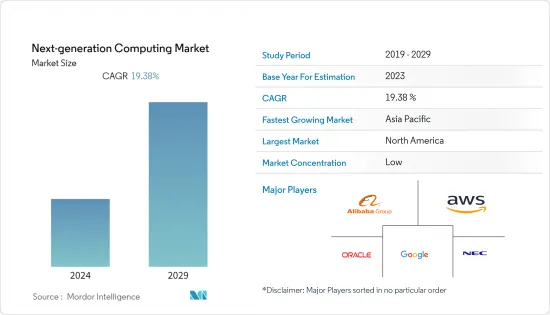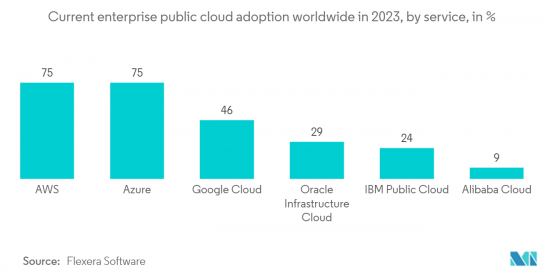
|
市場調査レポート
商品コード
1408396
次世代コンピューティング:市場シェア分析、産業動向・統計、2024~2029年成長予測Next-generation Computing - Market Share Analysis, Industry Trends & Statistics, Growth Forecasts 2024 - 2029 |
||||||
カスタマイズ可能
適宜更新あり
|
|||||||
| 次世代コンピューティング:市場シェア分析、産業動向・統計、2024~2029年成長予測 |
|
出版日: 2024年01月04日
発行: Mordor Intelligence
ページ情報: 英文 120 Pages
納期: 2~3営業日
|
全表示
- 概要
- 目次
次世代コンピューティングの世界市場規模は、今年度1,605億1,000万米ドルで、予測期間中のCAGRは19.38%を記録し、5年後には4,174億米ドルに達すると予測されています。
次世代コンピューティング・ソリューションを導入することで、エンドユーザーは製品開発のリードタイム短縮、柔軟性、プロセスの効率化、生産性の向上、品質の向上、より直感的な顧客体験、収益性の改善などを実現し、世界の市場普及に拍車をかけています。

主なハイライト
- 次世代コンピューティング市場は、分散コンピューティング、機械学習、人工知能、クラウドコンピューティングなど、ストレージ、メモリ、処理、帯域幅を集中化することで効率的なコンピューティングを実現する新技術の登場によって発展しており、さまざまな最終用途で市場を牽引しています。
- ハイパフォーマンス・コンピューティングの需要は増加しており、大量のデータを迅速かつ効率的に計算・分析できるようになるため、組織にとって極めて重要なものとなりつつあります。ハイパフォーマンス・コンピューティング・アプリケーションのための次世代コンピューティング・ソリューションへのニーズが、市場を牽引しています。
- さらに、サプライチェーン管理の改善、生産性の向上、業務の合理化により、中小企業はデジタルトランスフォーメーションの恩恵を受けています。中小企業は、クラウドコンピューティング、AI、ブロックチェーンを利用してプロセスを自動化し、コストを削減しており、これが予測期間中の市場を牽引します。例えば、2022年12月、デジタルトランスフォーメーション・ソリューション・プロバイダーであるUSTは、マレーシア北部の中小企業向けにインダストリー4.0のデジタルトランスフォーメーションの旅を可能にするため、インテルおよびSAPとの協業を発表し、インダストリー4.0向けの次世代コンピューティング・ソリューションにより、市場ベンダーに機会を創出しました。
- しかし、次世代ソリューションとコンピューティング技術には、ローカルデバイス、モバイルデバイス、クラウドベースのサーバーなどの間で共有されるデータの処理が含まれるため、エンドユーザーがビジネスプロセスにソリューションを導入する際にデータプライバシーリスクの脅威が発生し、予測期間中に防衛、BFSIなど多くのエンドユーザーでの市場導入が制限される可能性があります。
- COVID-19の流行は、SOCや次世代コンピューティング・ソリューションのその他のハードウェア・コンポーネントの開発に不可欠な半導体チップの製造に必要な原材料のサプライチェーンを遅延させることにより、市場の成長を低下させました。また、COVID-19パンデミックの後、クラウドコンピューティングの需要が増加し、エンドユーザーの計算能力を向上させるアプリケーションにより、次世代コンピューティングソリューションの成長を支えました。
次世代コンピューティング市場動向
ソリューションのクラウド展開が市場成長に大きく貢献
- クラウドベースのコンピューティング・ソリューションの採用は、コスト削減、セキュリティ、柔軟性、機動性、コラボレーションの強化、容易な災害復旧と損失防止、ソフトウェアの自動更新などの利点により、世界中の大企業や小規模企業を含むすべてのエンドユーザーで支持を集めており、市場におけるクラウドベースの次世代コンピューティング・ソリューションの採用に拍車をかけています。
- 先進国および新興経済諸国の企業は、各国の政府によるICTインフラへの投資を背景に、クラウドベースのソフトウェアを採用しており、予測期間中のクラウドベースの次世代コンピューティング・ソリューション市場の成長を支えています。例えば、アマゾン・ウェブ・サービスは2022年11月、ドバイ・デジタル・エコノミー商工会議所(Dubai Chamber of Digital Economy)と提携し、スケーラブルなクラウドストレージ、サービス、コンピューティング機能を含むハイパースケールクラウドコンピューティングソリューションが、2022年から2030年にかけてUAEの中小企業や新興企業に171億米ドル相当の経済的利益をもたらすと期待されるとのレポートを発表しました。
- マイクロソフト、アマゾン、IBM、グーグルなどのベンダーは、量子コンピュータに多額の投資を行っており、クラウドベースの量子コンピュータにSaaSモデルを提供するために提携しています。これらは従量課金モデルとして利用でき、クラウド対応次世代コンピューティング・ソリューション市場を牽引しています。
- 例えば、HCLテクノロジーズは2023年3月、マイクロソフトの量子クラウド・コンピューティング・サービスであるAzure Quantumと提携し、マイクロソフトのプラットフォームを技術スタックとして使用するクライアントに、クラウドベースの量子コンピューティング・サービスを企業に提供します。HCLTechのQ-Labsは、Azure Quantumのクレジットを提供するマイクロソフトのパートナーの1つとなっています。
- さらに、クラウドベースの量子コンピューティング・プロバイダーは、量子コンピューティング分野の他の組織との協力を通じて、量子コンピューティングを効果的に利用する必要性をアドバイスし、企業のクラウドベースのサービス導入を支援してきました。例えば、IBMはIBM's Q Networkを開発しました。これは、先進的な量子コンピューティングの分野で協力し、その潜在的なアプリケーションを探求する組織による世界・パートナーシップであり、市場におけるクラウドベースの次世代コンピューティングの採用を支援しています。

アジア太平洋地域が最も高い市場成長率を記録
- アジア太平洋地域には、インド、中国、日本、韓国など、デジタル化ソリューションを採用する新興経済国が多数存在します。ヘルスケア、自動車・運輸、BFSI、IT・通信など、さまざまなエンドユーザーにおけるデジタル化は、企業の生産性を向上させるAI・MLベースのコンピューティングの必要性から、次世代コンピューティングソリューションプロバイダーの市場ベンダーにチャンスをもたらしています。
- 例えば、2023年6月には、エンタープライズグレードの人工知能(AI)ソフトウェアの大手企業であるBeyond Limits社が、アジア太平洋地域における量子AI技術の進歩を推進するために、量子コンピュータの構築企業であるIQM Quantum Computers社と覚書を締結しており、これは同地域における量子コンピューティングの需要を示しており、予測期間中のAPAC地域の市場を促進しています。
- APAC地域の病院を含む小規模および大規模企業におけるオンラインサービスの採用は、大量のビジネスデータを生成するため、企業がこれらのデータからビジネスインサイトを得ることを可能にする次世代コンピューティングソリューションの要件を促進します。例えば、2022年11月、インドのManipal Hospitals Groupは、患者の治療体験と病院チェーンのネットワーク効率を改善するためにGoogle Cloudと提携しました。グーグル・クラウドの会話AIベースのソリューションを利用し、常時患者ケアを提供することで顧客との対話を強化します。
- さらに、シンガポール、マレーシア、インドネシアは、多くの大規模データセンターを建設しており、APAC地域の大規模産業企業における次世代コンピューティングの成長を支えています。
- 例えば、2023年7月、エクイニクス、GDS、マイクロソフト、AirTrunkとTikTokを所有するByteDanceのコンソーシアムが、シンガポール経済開発庁と情報通信メディア開発庁によって、シンガポールを拠点とする80MWのデータセンターの運営に選ばれました。
次世代コンピューティング産業の概要
世界の次世代コンピューティング市場は、アリババ・グループ・ホールディング・リミテッド(Alibaba Group Holding Limited)、アマゾン・ウェブ・サービス(Amazon Web Services Inc)、オラクル・コーポレーション(Oracle Corporation)、グーグル合同会社(Google LLC)、日本電気株式会社(NEC Corporation)など多くの世界企業が市場全体のシェアに貢献しているため、非常に細分化されています。次世代コンピューティング市場のベンダーは、予測期間中に市場での存在感を高めるため、製品のイノベーション、提携、研究開発への投資を通じて、より強化されたソリューションの提供にますます注力するようになっています。
2023年6月、Google LlcはT-Mobileと提携し、5Gとエッジコンピューティング機能を強化し、企業のデジタルトランスフォーメーション拡大を可能にしました。この提携後、T-Mobileはパブリック、プライベート、ハイブリッド5Gネットワークの5G ANSスイートとGoogle Distributed Cloud Edge(GDC Edge)を接続し、顧客がAR/VR体験などの次世代5Gアプリケーションを利用できるようになります。
その他の特典:
- エクセル形式の市場予測(ME)シート
- 3ヶ月間のアナリストサポート
目次
第1章 イントロダクション
- 調査の前提条件と市場定義
- 調査範囲
第2章 調査手法
第3章 エグゼクティブサマリー
第4章 市場洞察
- 市場概要
- 業界の魅力度-ポーターのファイブフォース分析
- 供給企業の交渉力
- 買い手の交渉力
- 新規参入業者の脅威
- 代替品の脅威
- 競争企業間の敵対関係
- 業界バリューチェーン分析
- COVID-19の市場への影響評価
第5章 市場力学
- 市場促進要因
- 高性能コンピューティングに対する需要の伸び
- 中小企業における高度分析の採用
- 市場抑制要因
- 次世代コンピューティングにおける大規模データの保存と処理におけるデータ漏洩のリスク
- ソリューション導入における高い運用課題
第6章 市場セグメンテーション
- コンポーネント別
- ハードウェア
- ソフトウェア
- サービス別
- コンピューティングタイプ別
- 高性能コンピューティング
- 量子コンピューティング
- オプティカル・コンピューティング
- エッジコンピューティング
- その他のコンピューティング・タイプ
- デプロイメント別
- クラウド
- オンプレミス
- エンドユーザー別
- 自動車・運輸
- エネルギー・ユーティリティ
- ヘルスケア
- BFSI
- 航空宇宙・防衛
- メディア&エンターテイメント
- IT &テレコム
- 小売
- 製造業
- その他のエンドユーザー
- 地域別
- 北米
- 欧州
- アジア太平洋
- ラテンアメリカ
- 中東・アフリカ
第7章 競合情勢
- 企業プロファイル
- Alibaba Group Holding Limited
- Amazon Web Services, Inc
- Oracle Corporation
- Google LLC
- NEC Corporation
- Cisco Systems
- Intel Corporation
- IBM Corporation
- Microsoft Corporation
- NVIDIA Corp
- *List not exhaustive
第8章 投資分析
第9章 市場機会と今後の動向

Global Next-generation Computing Market is valued at USD 160.51 billion in the current year and is expected to register a CAGR of 19.38% during the forecast period, reaching USD 417.40 billion in five years. Implementing Next-generation computing solutions gives end users a shorter lead time in product development, flexibility, process efficiencies, enhanced productivity, higher quality, more intuitive customer experiences, and improved profitability, fueling market adoption worldwide.
Key Highlights
- Next-generation computing market is evolving from the emergence of new technologies such as Distributed computing, Machine learning, Artificial intelligence, and Cloud computing for efficient computing by using centralizing storage, memory, processing, and bandwidth, driving the market in various end-user applications.
- The demand for High-performance computing is increasing and becoming crucial for organizations as it enables them to compute and analyze large volumes of data quickly and efficiently, which is significantly essential in scientific research, engineering, and finance, where the ability to process large amounts of data to give insights for better operational efficiencies and customer services. The need for next-gen computing solutions for High-performance computing applications drives the market.
- Additionally, with better supply chain management, increased productivity, and streamlined operations, SMEs have benefited from digital transformation. SMEs have been automating their processes and reducing costs using cloud computing, AI, and blockchain, which would drive the market during the forecast period. For instance, in December 2022, UST, a digital transformation solutions provider, announced a collaboration with Intel and SAP to enable the Industry 4.0 digital transformation journey for small and medium-sized enterprises in northern Malaysia, creating an opportunity for the market vendors due to their next-gen computing solutions for Industry 4.0.
- However, the next-gen solutions and computing technology involve processing & data shared between local devices, mobile devices, cloud-based servers, etc., which generates a threat of data privacy risk in the end users while implementing the solutions for their business processes, which could restrict the market adoption in many end-users, such as defense, BFSIs, etc. during the forecast period.
- The COVID-19 pandemic reduced the market growth by delaying the supply chain of raw materials for the manufacturing of semiconductor chips, which are essential for developing SOCs and other hardware components of next-generation computing solutions. In addition, after the COVID-19 pandemic, as the demand for cloud computing increased, it supported the growth of Next-generation computing solutions due to its applications enabling end users to enhance their computational capabilities.
Next-generation Computing Market Trends
The Cloud Deployment of The Solutions Significantly Contributes to The Market Growth
- The adoption of cloud-based computing solutions is gaining traction in all end-users, including large and small-scale enterprises worldwide, due to its benefits such as Cost Savings, Security, Flexibility, Mobility, Increased Collaboration, Easy Disaster Recovery & Loss Prevention, Automatic Software Updates, etc., which is fueling the adoption of cloud-based next-generation computing solutions in the market.
- The enterprises in developed and developing economies, with the help of their countries' government investment in ICT infrastructure, are adopting cloud-based software, supporting the growth of the cloud-based next-generation computing solution market during the forecast period. For instance, in November 2022, Amazon Web Services, in partnership with the Dubai Chamber of Digital Economy, published a report stating that hyper-scale cloud computing solutions, which include scalable cloud storage, services, and computing capabilities, are expected to provide SMEs and startups in the UAE with USD 17.1 billion worth of economic benefits from 2022 and 2030.
- Market vendors such as Microsoft, Amazon, IBM, and Google have been investing significantly in quantum computing and partnering to offer SaaS models to their cloud-based quantum computers, enabling the technology to be accessible to mainstream enterprises, which can be shared among many companies. They can be used as a Pay-as-Use model, driving the Cloud-enabled next-generation computing solutions market.
- For instance, in March 2023, HCL Technologies partnered with Microsoft's quantum cloud computing service, Azure Quantum, to offer businesses cloud-based quantum computing services to clients using Microsoft's platform as the technology stack. The benefits would be provided through HCLTech's Q-Labs, which has already been among one of Microsoft's partners to offer Azure Quantum credits.
- Additionally, cloud-based quantum computing providers have been helping in advising the need to use quantum computing effectively and supporting the enterprise's adoption of cloud-based services through collaboration with other organizations in the field of quantum computing. For instance, IBM has developed IBM's Q Network, a global partnership of organizations working together in advanced quantum computing and exploring its potential applications, supporting the adoption of cloud-based next-generation computing in the market.

The Asia-pacific Region is Registering The Highest Market Growth
- The Asia-Pacific region has many emerging economies, including India, China, Japan, South Korea, etc., adopting digitalization solutions in their countries. The digitalization in various end users, such as Healthcare, Automotive & Transportation, BFSIs, IT & Telecom, etc., in the countries are creating an opportunity for the market vendors of next-generation computing solution providers due to the need for AI & ML based Computing in increasing the productivity of the enterprises.
- For instance, in June 2023, Beyond Limits, a leading enterprise-grade artificial intelligence (AI) software company, signed a Memorandum of Understanding with IQM Quantum Computers, a company in building quantum computers, to drive the advancement of quantum AI technology in the Asia-pacific region, which shows the demand for quantum Computing in the area, fueling the market in APAC region during the forecast period.
- The adoption of online services in small and large-scale enterprises, including the hospitals in the APAC region, generates a significant amount of business data, which drives the requirement for Next-generation computing solutions to enable the enterprises to have business insights from those data. For instance, in November 2022, Manipal Hospitals Group of India partnered with Google Cloud to improve patient care experiences and the hospital chain's network efficiency. It would use Google Cloud's conversational AI-based solution to enhance customer interactions by offering all-time patient care.
- In addition, Singapore, Malaysia, and Indonesia have constructed many large data centers, which would support the growth of Next-generation computing in large-scale industrial enterprises within the APAC region because adopting these solutions, majorly the cloud-based next-generation computing solutions, would require Data centers to store the enterprise data for Computing.
- For instance, in July 2023, Equinix, GDS, Microsoft, and a consortium of AirTrunk and TikTok-owner ByteDance were selected to operate the Singapore-based 80 MW data center by the Singapore Economic Development Board and the Infocomm Media Development Authority, which would support the adoption of next-generation computing solutions in the APAC region.
Next-generation Computing Industry Overview
The Global Next-generation Computing Market is highly fragmented due to many global companies, such as Alibaba Group Holding Limited, Amazon Web Services Inc, Oracle Corporation, Google LLC, and NEC Corporation, contributing to the overall market share. Next-generation Computing Market vendors increasingly focus on delivering enhanced solutions through product innovations, collaborations, and investment in R&D to increase their market presence during the forecast period.
In June 2023, Google Llc partnered with T-Mobile to empower 5G and edge computing capabilities, enabling enterprises to increase their digital transformation. After this partnership, T-Mobile would connect the 5G ANS suite of public, private, and hybrid 5G networks with Google Distributed Cloud Edge (GDC Edge) to help customers have next-generation 5G applications such as AR/VR experiences.
Additional Benefits:
- The market estimate (ME) sheet in Excel format
- 3 months of analyst support
TABLE OF CONTENTS
1 INTRODUCTION
- 1.1 Study Assumptions and Market Definition
- 1.2 Scope of the Study
2 RESEARCH METHODOLOGY
3 EXECUTIVE SUMMARY
4 MARKET INSIGHTS
- 4.1 Market Overview
- 4.2 Industry Attractiveness - Porter's Five Forces Analysis
- 4.2.1 Bargaining Power of Suppliers
- 4.2.2 Bargaining Power of Buyers
- 4.2.3 Threat of New Entrants
- 4.2.4 Threat of Substitutes
- 4.2.5 Intensity of Competitive Rivalry
- 4.3 Industry Value Chain Analysis
- 4.4 Assessment of the Impact of COVID-19 on the Market
5 MARKET DYNAMICS
- 5.1 Market Drivers
- 5.1.1 Growth in demand for high performance computing
- 5.1.2 Adoption of Advanced Analytics in SMEs
- 5.2 Market Restraints
- 5.2.1 Risk of Data Breach in Storing and Processing Large Data in Next-gen Computing
- 5.2.2 High operational challenges in Implementing the Solution
6 MARKET SEGMENTATION
- 6.1 By Component
- 6.1.1 Hardware
- 6.1.2 Software
- 6.1.3 Services
- 6.2 By Computing Type
- 6.2.1 High-Performance Computing
- 6.2.2 Quantum Computing
- 6.2.3 Optical Computing
- 6.2.4 Edge Computing
- 6.2.5 Other Computing Types
- 6.3 By Deployement
- 6.3.1 Cloud
- 6.3.2 On-Premise
- 6.4 By End-user
- 6.4.1 Automotive & Transportation
- 6.4.2 Energy & Utilities
- 6.4.3 Healthcare
- 6.4.4 BFSI
- 6.4.5 Aerospace & Defense
- 6.4.6 Media & Entertainment
- 6.4.7 IT & Telecom
- 6.4.8 Retail
- 6.4.9 Manufacturing
- 6.4.10 Other End Users
- 6.5 By Geography
- 6.5.1 North America
- 6.5.2 Europe
- 6.5.3 Asia-pacific
- 6.5.4 Latin America
- 6.5.5 Middle East and Africa
7 COMPETITIVE LANDSCAPE
- 7.1 Company Profiles
- 7.1.1 Alibaba Group Holding Limited
- 7.1.2 Amazon Web Services, Inc
- 7.1.3 Oracle Corporation
- 7.1.4 Google LLC
- 7.1.5 NEC Corporation
- 7.1.6 Cisco Systems
- 7.1.7 Intel Corporation
- 7.1.8 IBM Corporation
- 7.1.9 Microsoft Corporation
- 7.1.10 NVIDIA Corp
- 7.2 * List not exhaustive

